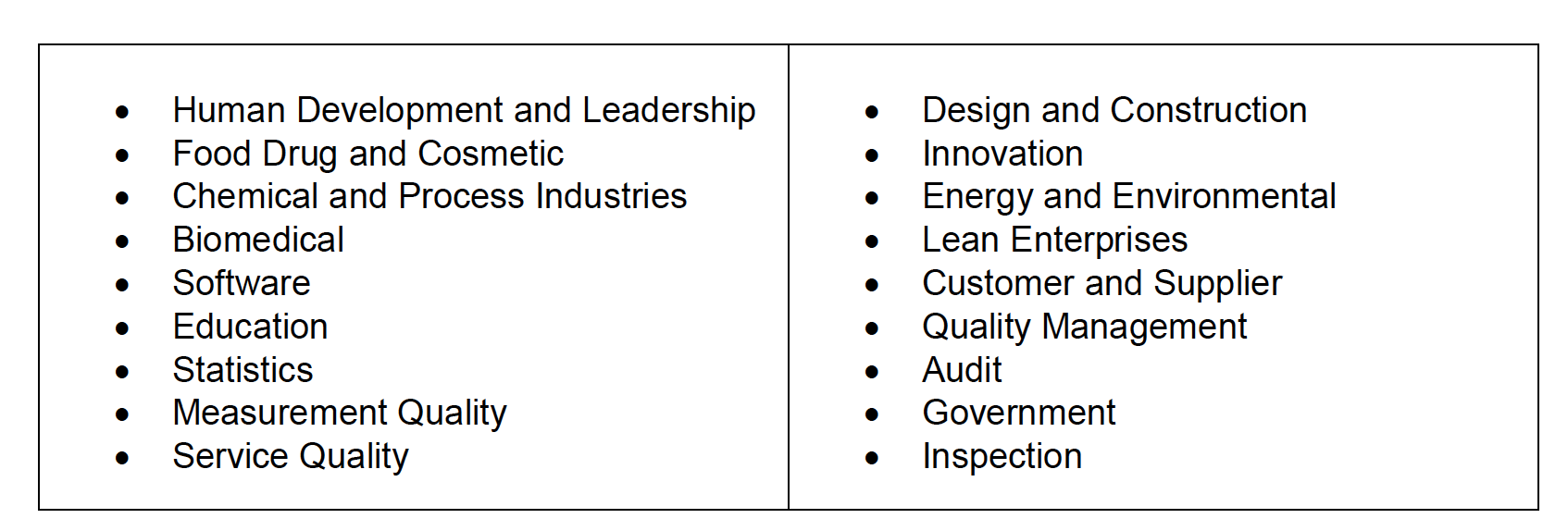 Standards represent some of the best ideas on how to do something. Everyone reading this article has an opportunity to make things better through standards. Did you know ASQ is accredited by the American National Standards Institute (ANSI) to issue US national standards and technical reports (TR) related to quality management principles, tools, and technology? Technically speaking, ASQ is an ANSI-accredited Standards Development Organization (SDO) with the ASQ Standards Committee serving as the consensus body for the development of American National Standards that are not product-specific or safety-related.
Standards represent some of the best ideas on how to do something. Everyone reading this article has an opportunity to make things better through standards. Did you know ASQ is accredited by the American National Standards Institute (ANSI) to issue US national standards and technical reports (TR) related to quality management principles, tools, and technology? Technically speaking, ASQ is an ANSI-accredited Standards Development Organization (SDO) with the ASQ Standards Committee serving as the consensus body for the development of American National Standards that are not product-specific or safety-related.
ASQ Standards Committee Approves and Publishes
The ASQ Standards Committee has tackled the publishing of quality management system guidelines for:
- education (ANSI/ASQ Z1.11)
- quality management system guidelines for environmental data and technology (ASQ/ANSI E4)
- standards for attribute skip-lot sampling and attribute chain sampling (ASQ/ANSI S1 and S3)
- best quality practices for biomedical research in drug development (TR)
- cost of quality guidelines for development (TR).
The Committee is currently engaged in:
- developing guidance for ensuring data integrity
- providing guidance for inspection techniques and requirements
- updating guidance for auditing in the energy sector
Sharing best practices as an ANSI standard or TR helps everyone. They lower risk and improve the chances organizations will achieve the results they expect.
Creating a standard is admittedly a slow process, but the benefits are huge. America and the world would be chaotic if not for standards including those for utilities, mobile telephones, the Internet, gas pumps, paper sizes, food ingredients and so on. If every company did their own thing, so to speak, it would be madness. Standards may address general societal issues or may only be useful to a specific industry or sector such as government or education. Overall, they can benefit society, save resources, eliminate redundancy, and provide the guidance necessary to perform a task or service consistently and correctly. If done right, a standard or technical report will be used for decades.
If you or someone you know is aware of a situation where a standard or technical report might be the solution, ASQ has the means, as well as, the authority to satisfy those needs. For example, is there an unmet need for guidance on topics such as vetting new suppliers, developing strategic plans, conducting inspections, creating effective metrics, verifying or validating products or processes, controlling information, or inspecting products?
Membership
The ASQ Standards Committee members represent a balance of various interest groups and sectors of society. You may already have the friendly ear of someone that talks your language. Some of the sectors and ASQ Divisions that currently participate as members of the Standards Committee include:
Our members also include members that are general Interest members. Typically, our general interest members are experts in their field. They volunteer their time because they know the opportunities and challenges facing our society. No single interest group dominates our activities. All activities are open and transparent.
One of the greatest benefits of participating in the development process is what you will learn from others. Exchanging ideas and discussing the pro and cons with colleagues is an education in and of itself. Writing best practices that will withstand the test of time is very challenging yet rewarding.
Ideas are welcome
We on the Standards Committee don’t make it complicated. What do you do if you know of a need for a standard or technical report that would be recognized nationally? To start the process, all you need to do is submit a New Work Item Proposal (NWIP) to the ASQ Standards Committee. Email standards@asq.org to request the NWIP form and process instructions. Yes, getting started is easy, but gathering experts and following the consensus process takes time.
Every idea is welcome. However, your idea may conflict with another process or there may be guidance already available. But, that is the beauty of working with the ASQ Standards Committee, ideas are fully vetted. When that happens, everyone benefits.
You can actively participate in the ASQ Standards Committee either as a General Interest member or ASQ Division representative. If you are interested in getting involved, email standards@asq.org for details and an application to become a General Interest member or contact your ASQ division leadership about representing your division.
The development of standards and technical reports provides a powerful opportunity to contribute to society and our profession. The ANSI name is nationally recognized and acknowledged as a neutral party to ensure consensus. You can make a difference affecting thousands of people and perhaps entire industries. In modern times standards have a new vision to improve and not hinder. For more information about ASQ’s standards activities go to:
http://asq.org/learn-about-quality/ansi-standards/
About the author
JP Russell is the managing director of Quality Web-Based Training Center for Education (www.qualitywbt.com). QualityWBT has offered online quality-related training classes since the year 2000. Russell designs and develops the classes. He is an ASQ Fellow and a voting member of the American National Standards Institute/ASQ Z1 committee. He is a member of the U.S. Technical Advisory Group to Technical Committee 176; the body responsible for the ISO 9000 standard series. Russell is a former RAB and IRCA lead auditor. He is an ASQ Certified Quality Auditor and the author of several ASQ Quality Press bestselling books including Process Auditing Techniques; Internal Auditing Basics; and ISO Lesson Guide 2015: Pocket Guide to ISO 9001:2015. Russell is the editor of the ASQ Auditing Handbook.

